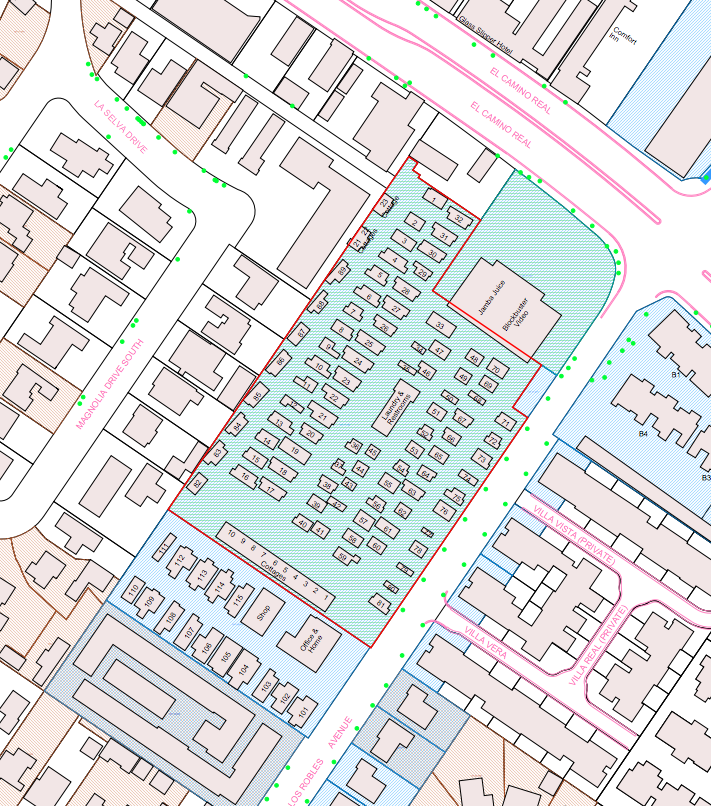Residents of Palo Alto’s Buena Vista Mobile Home Park have won three small victories in recent weeks that have given them hope they may be able to stay in their homes or at least receive adequate compensation if they do have to relocate.
In January, Palo Alto’s City Council decided it would allow residents of the town’s only mobile home park to appeal the city’s approval of a relocation plan put forth by the owners, who are seeking to sell the land on which the mobile home park sits.
A city official approved the package in September, moving the closure process along. But city council members will now meet in April to hear both sides and evaluate the relocation plan again.
Government officials have also pledged funds to try to help residents hold on to their homes. Santa Clara County Supervisor Joe Simitian in January offered $8 million in county funds to help purchase the property. And in February, Palo Alto City Manager James Keene allocated $8 million to help preserve the mobile home park.
The dispute began about two years ago, when the owners, the Jisser family, announced plans to sell the four-acre property that houses about 375 low-income residents. Buena Vista is a bastion of affordable housing in a city where the median sales price for a two-bedroom home is more than $1,200,000. If closed, the 99 Buena Vista children currently enrolled in Palo Alto’s school system would lose access to the city’s high quality schools.
In September, hearing officer Craig Labadie moved the closure process forward when he approved the Jissers’ proposed relocation plan, which included paying residents for the appraised value of their mobile home, their first and last month’s rent plus the security deposit, plus an additional rent subsidy for a year. Moving expenses would also be covered, as well as assistance for the disabled, such as help with packing and replacement of immovable special equipment.
But the Buena Vista Residents Association and its lawyers say the package is insufficient.
In a letter to the city, they argued that the owners’ appraised values of the mobile homes — which averaged about $18,000 but were as low as $5,500 — were inadequate.
“We had our own appraiser come in, and he told us twice as much,” said Erika Escalante, president of the Residents Association.

Additionally, the Jissers’, they argued, failed to prove there is comparable housing within 35 miles, which is a requirement under the ordinance that governs mobile home park closure in Palo Alto.
Dozens of residents packed a Jan. 12 city council meeting wearing matching “Save Our Homes” shirts and handing out “Keep BV Residents in PA” stickers. They waited quietly in the back of the chambers for the City Council to address their issue. When the time came, many residents and other Palo Altans spoke in support of the community.
After hours of proceedings, city council members voted unanimously to allow the appeal. Many celebrated. “We feel great! We want to go party!” said one resident standing in a group of other supporters.
However for some, the victory was bittersweet. “It’s good,” said resident Amanda Serrano, “but it’s also sad. I think they’re going to close the park.”
If the appeal passes in April, negotiations will begin on a new relocation plan, according to Winter Dellenbach, president of Friends of Buena Vista, a group of Palo Altans that support the Buena Vista residents’ fight to stay in their homes. If it fails, then paperwork would be filed and the residents would have six months to move out. However, Dellenbach said it could also go into litigation, which could extend the process.
Over the past two years, residents twice offered to seek outside funding and buy the property for $14.5 million. The Jissers’ appraiser said the property was worth $14.5 million as a mobile home park, and around $29 million if redeveloped for “highest and best use,” which Dellenbach said would most likely be condominiums.
The park owners’ attorney, Margaret Nanda objected in January to the city council’s decision to re-evaluate the relocation plan on procedural grounds, saying the residents association was ineligible to file an appeal as an “aggrieved person” under city ordinances. In October 2013, she told NPR her client “is not a social agency or a nonprofit. He’s a private business operator who wants to sell his property.”
Simitian, in making his $8 million pledge, said he hoped the contribution would attract other groups interested in contributing or purchasing the property.
“We believe the appropriate use of these funds might provide the impetus necessary to turn the current conversation … to determining if and how the property can be preserved as a long-term supply of deed-restricted affordable housing,” he wrote in his referral to the Board of Supervisors.
City Manager Keene’s offer is the first to match Simitian’s, and has a similar goal.
“It is my hope that this action — following on the county’s recent pledge of an equal amount — will inspire those who are concerned about the future of affordable housing in Silicon Valley and Palo Alto specifically, to come together and work toward a solution that will work for all,” Keene wrote in a memo to Mayor Karen Holman and city council.
Much about the future of Buena Vista is still unclear, but these recent developments have created new possibilities for residents. “No doors have closed, in terms of possibilities,” Dellenbach said. “And therefore, all doors are open.”
